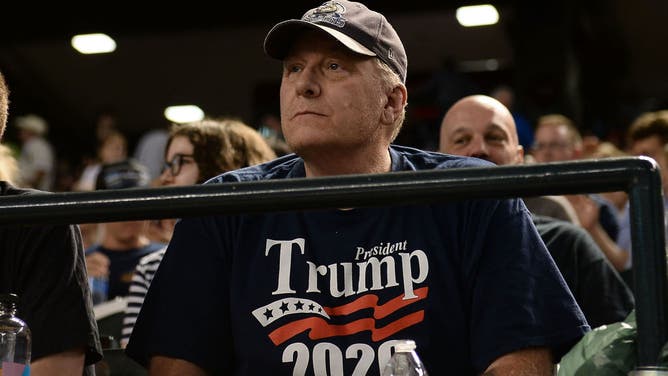Curt Schilling Blasts The Baseball Writers Who Vote On The Hall Of Fame
How does Curt Schilling REALLY feel about the baseball writers who snub and attack him….
Baseball writers over the past few years have become increasingly political, with many overtly expressing their opinions, often far left opinions, on social media platforms.
Schilling is perhaps the best example of how liberal bias has infested even something as seemingly disconnected from politics as baseball’s Hall of Fame voting.

Curt Schilling watches the MLB game between the San Francisco Giants and Arizona Diamondbacks at Chase Field on August 3, 2018 in Phoenix, Arizona. (Photo by Jennifer Stewart/Getty Images)
Schilling undoubtedly deserves to be in the Hall of Fame thanks to a sterling MLB career that saw him finish with 216 wins, a 3.46 ERA and nearly 80 career wins above replacement.
In 2002, he struck out over 300 hitters in a season, an extremely rare accomplishment in modern baseball. His career WAR places him 26th among all MLB pitchers.
If you're still on the fence about whether or not Schilling should be in the Hall, we need to look at postseason numbers.
Schilling carries an 11-2 record in 19 postseason starts. He posted a 2.23 ERA over 133.1 innings giving up 33 earned runs in the process.
Yet somehow, every year since he's been eligible, he's come up short in the Hall of Fame voting.
Even when using Baseball-Reference's Hall of Fame reference statistics, he clears the bar set by other pitchers who've been elected into Cooperstown.
There's only possible explanation; baseball writers don't like his politics.
Schilling sees it the same way, crediting a few writers for their honesty, while pointing out that many others, who are what he describes as "bad people," openly despise him:
"There are always exceptions to the rule for every Jason Stark and Tim Kurkjian, phenomenal human beings and great writers and people who have written bad stuff about me, but they're honest and they love the sport."
"So it's like a lot of things for me when I look at the left, the people in the media that despise me and all the things they said about me, that means I'm morally and ethically living my life, right? Because these are bad, just bad people. Where I think that impacted me the most was during the 10 years I was on the Hall of Fame ballot. The things that were being said about me obviously weren't even remotely true. There were writers that knew it."
He's right; if you're upsetting bad people, you're doing something right.
The fact that baseball writers are willing to deny someone deserved recognition because they disagree with him politically makes them bad people.
Imagine the outcry if the situation was reversed, and conservative writers were denying an openly liberal player entry to the Hall of Fame because of his political opinions.
But that's what's happening here. And it's entirely indefensible. Too bad, that as Schilling says, "Not one of them ever came out and said, that's ridiculous."